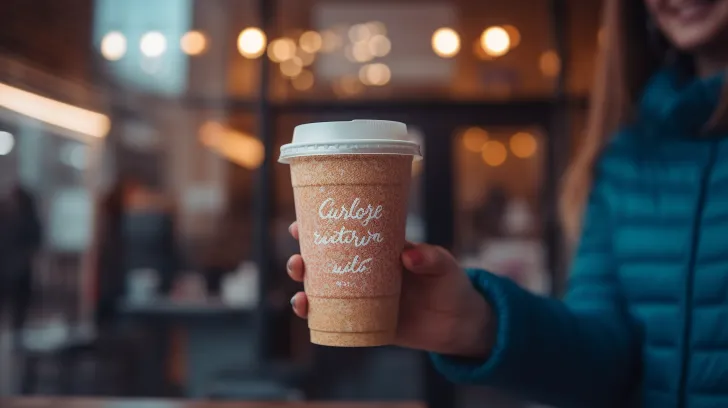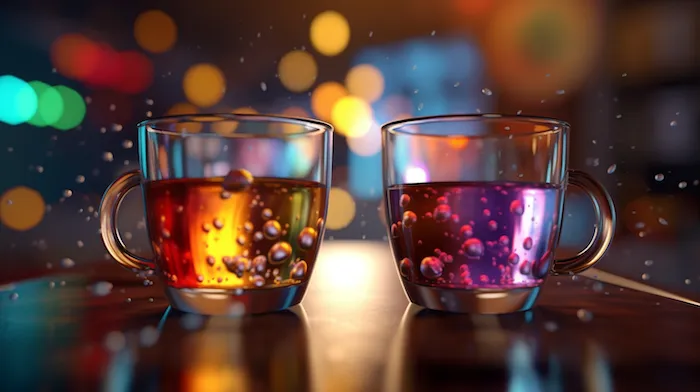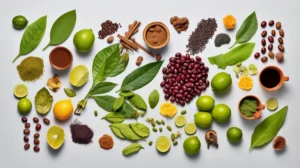Are you tired of feeling sluggish and needing a pick-me-up during the day? Look no further than caffeine, a natural stimulant in many popular beverages. But with so many options available, it can be hard to decide which is best for you: liquid energy drinks or coffee.
In this article, we will delve into the world of liquid caffeine vs coffee and compare them based on their ingredients, caffeine content, convenience, cost, health benefits, potential side effects, and taste. Whether you’re looking for an early morning boost or a mid-day jolt, understanding the differences between these two options can help you decide how to get your daily dose of caffeine.
So sit back and grab your favorite Liquid Caffeine recipe as we explore which option might be better for you.
Key Takeaways
- Caffeine is a natural stimulant found in tea, coffee, chocolate, and other beverages, which works by stimulating the brain and central nervous system to prevent tiredness and promote focus.
- Up to 400mg of caffeine per day is the safe spot for healthy adults, but caffeine tolerance and metabolism is highly individual, and reducing caffeine intake can cause withdrawal symptoms.
- Coffee has more caffeine per oz than energy drinks, but energy drinks are more convenient, cheaper when bought in bulk, and contain less caffeine and are less likely to cause a crash.
- Both coffee and energy drinks have potential side effects, but coffee may have health benefits like supporting brain function and boosting metabolism, while energy drinks may support mental and physical performance and weight loss, and both can come in various flavors and be derived from natural sources.
Caffeine Content Comparison
If you’re wondering which has more caffeine, coffee or energy drinks, the answer is coffee – it’s got more caffeine per oz than any energy drink out there! However, the concentration of naturally occurring caffeine varies depending on the source.
For example, a typical 8oz cup of drip-brewed coffee contains around 95mg of caffeine, while an equivalent tea serving only has about 47mg. On the other hand, some energy drinks can have up to 200mg of caffeine per serving.
Sources and variations in brewing methods also play a role in determining how much caffeine ends up in your cup of Joe. Espresso shots contain less caffeine than drip-brewed coffee despite their stronger taste due to their shorter extraction time.
Caffeine tolerance and metabolism is also highly individual, making it difficult to determine safe limits for everyone. It’s important to be aware of safe limits and risks associated with excessive consumption of natural or synthetic sources of caffeine when trying to enhance performance and memory.
Convenience and Cost
You’ll love how easy and affordable energy drinks are compared to coffee, especially when bought in bulk or in the form of a liquid shot or powder. Here are three reasons why:

- Time savings: Energy drinks can be consumed quickly, without waiting for water to boil or brewing time.
- On-the-go options: Energy drinks can be taken anywhere, anytime, making them perfect for busy individuals who need a quick pick-me-up.
- Pricing comparison: Compared to cafes or expensive organic beans, energy drinks are significantly more affordable.
Additionally, accessibility factors such as ease of purchase and availability make energy drinks convenient for those seeking caffeine. However, it’s important to consider environmental impact considerations such as packaging waste and sustainability practices when choosing between liquid energy drinks and other options like coffee.
Moving on to benefits and side effects comparison…
Benefits and Side Effects Comparison

Experience the potential benefits and side effects of your preferred energy source to decide which option aligns with your health goals.
Coffee has been linked to several health benefits, including supporting brain function, boosting metabolism, and even helping you live longer. It may also boost mood and improve cognitive performance. However, coffee can also cause negative effects such as restlessness, insomnia, bowel movements, and crashes if consumed in excess. Additionally, caffeine dependence is common in coffee drinkers.
On the other hand, liquid energy drinks contain natural sources of energy like caffeine, taurine, potassium, and vitamin B12. They may support mental and physical performance as well as weight loss. Energy drinks are also less likely to cause a crash due to their lower caffeine content. However, they still have potential risks like any caffeinated beverage.
It’s important to consider both the positive effects and negative effects before making a decision on which option is better for you based on your personal health goals and lifestyle choices.
Frequently Asked Questions
Are there any risks associated with consuming caffeine pills instead of liquid energy drinks or coffee?
Consuming caffeine pills can have risks such as addiction potential, withdrawal symptoms, and health concerns. However, with proper dosage control and high-quality products that avoid harmful fillers, they can be a convenient and effective way to get a precise dose of caffeine.
How does the caffeine content in tea compare to that in coffee and energy drinks?
Comparing caffeine content, tea has less than coffee and energy drinks. Caffeine intake recommendations suggest up to 400mg per day for healthy adults. Caffeine can enhance athletic performance but effects vary by individual.
Are there any differences in how the body processes caffeine from different sources?
Caffeine processing differences are a fact. Liquid caffeine is absorbed faster than solid, impacting sleep quality and athletic performance. Caffeine source may also affect anxiety levels, but further research is needed to confirm this correlation.
Can consuming too much caffeine lead to long-term health problems?
Excessive caffeine consumption can lead to long-term health problems such as anxiety, insomnia, and heart disease. Recommended caffeine intake is up to 400mg/day. Caffeine withdrawal symptoms and addiction are common and can affect mental health.
Are there any natural alternatives to caffeine that can provide a similar energy boost?
You can try natural alternatives such as herbal supplements like ginseng or rhodiola, energy-boosting foods like bananas or almonds, and exercise benefits for mental stimulation. These options provide a similar energy boost without relying on caffeine.
Congratulations! You’ve reached the end of this caffeine-fueled journey. Now that we’ve compared liquid energy drinks and coffee, which one is better for you? Let’s recap.
In terms of caffeine content, energy drinks tend to have more than coffee. However, coffee has natural antioxidants and beneficial nutrients that can improve your overall health.
When it comes to convenience and cost, coffee is easy to make at home and cheaper in the long run. Energy drinks may be more convenient on-the-go but can also be pricey.
Ultimately, choosing between liquid energy drinks and coffee depends on your preference and lifestyle. Whichever option you choose, remember to consume them in moderation to avoid negative side effects such as jitters or insomnia.
In conclusion, whether you prefer a bold brew or a bubbly beverage, both options have pros and cons. It’s up to you to decide which one fits your needs best. So go ahead and sip on your preferred pick-me-up – remember to do so safely! We think it should be Liquid Caffeine!


